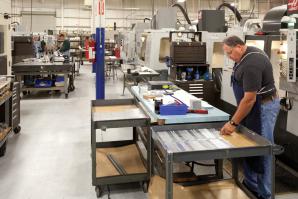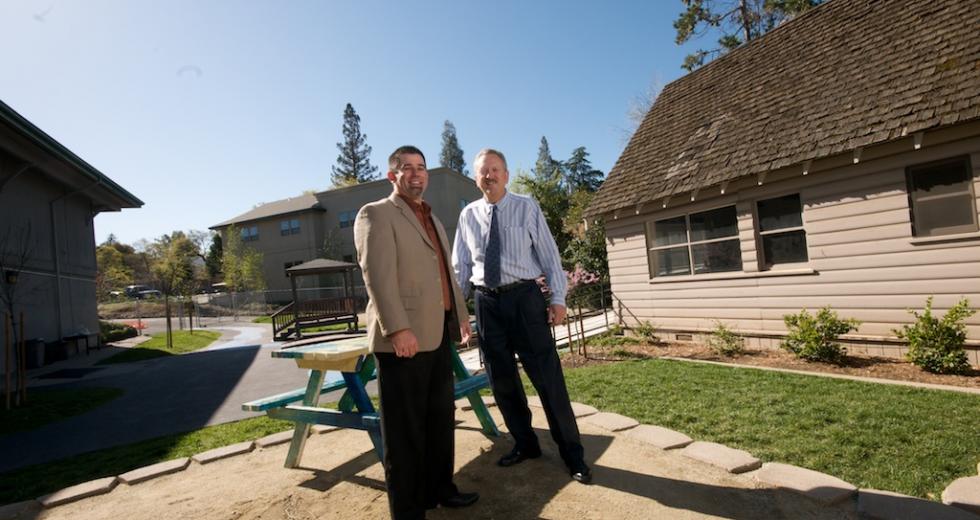A serendipitous land purchase in Auburn is breathing life into a town property hard-hit by the economy.
Community 1st Bank, which was organized in 2005 and opened its Roseville headquarters in 2006, has purchased and repurposed nearly five acres of prime commercial real estate in downtown Auburn and is looking to bring in new tenants.
With an eye on the local markets, the bank’s president Mark Lund foresaw the looming closure of neighboring competitor Placer Sierra Bank in 2005, so he quickly opened and positioned a small Community 1st Bank branch in Auburn to absorb Placer Sierra’s local customers.
But the sale and potential customer swap didn’t go so smoothly. Wells Fargo acquired Placer Sierra in 2007, and within six months shuttered the bank’s Auburn headquarters.
“There were 145 jobs that went away,” Lund says. “It was the beginning of the downturn, so the impact on a town already experiencing reduced tax and sales revenues was devastating.”
Community 1st was interested in purchasing the 22,000-square-foot bank on Lincoln Way, but Wells Fargo was only interested in selling the entire 4.5-acre property and its half-dozen buildings. To make a potential sale even more complicated, 3.3 acres of the historic land is on a long-term lease from Union Pacific and is part of the original Transcontinental Railroad easement.
But Lund saw potential in the property — big potential -— and with the idea of bringing new tenants, businesses and jobs to town, he was able to convince his board of directors to purchase the entire campus for an undisclosed amount.
“I worked Wells Fargo. I worked them hard, and we got a really good deal,” he says. “Our intention was to use the property for the good of the company — open a headquarters, open a bank branch, develop a downtown office — but we also saw an opportunity to redevelop the property for new businesses that would bring even more jobs.”
Today, the bank has about 30 employees at the new location, and Lund has attracted a handful of other small businesses to the property: J. Randall Smith art studio, local paleontologists and The Boys & Girls Club of Auburn.
“We felt that if we got a favorable enough rate on the buildings that we could lease all of the extra space to businesses,” Lund says. “We are doing that, and we now have five leases signed and two leases that are close to being signed,” including one with a local winery.
Of the 29,500 square feet of office, retail and warehouse space on the property, 10,000 is available among four buildings. Lease rates range 45 cents to $1.20 per square foot.
“I worked Wells Fargo. I worked them hard, and we got a really good deal.”
Mark Lund, president, Community 1st Bank
“Certainly getting employees and more activity up there is good. It’s an end of downtown that we have been hoping to get more activity into,” says Will Wong, the city’s redevelopment director. “That part of Lincoln Way has pedestrian-friendly amenities with sidewalks and angled parking. The question is whether we can bring some retail up there. It will be interesting to see if the winery makes it; I hope that it does. It could bring much more activity.”
The Boys & Girls Club of Auburn, which serves 100 to 190 youth ages 6 to 18 daily at its downtown location, was housed in Auburn’s antiquated firehouse and City Hall. But when, after a decade, the organization’s $1 annual lease was set to expire, leadership went hunting for a new locale that could accommodate the swelling membership.
“We were looking at building a new clubhouse and headquarters … we looked at commercial buildings … the costs were astronomical,” says Randy Tooker, the club’s chief professional officer. “When we found out the project we estimated to cost $3.5 million was going to cost $7.5 million, we pulled out.”
The club was able to purchase 1.2 acres of land, complete with a 10,000-square-foot former bank remodeled to serve as a clubhouse and an 800-square-foot log cabin repurposed as an art center for $1.2 million. In addition, the club signed a 20-year lease on an adjacent 3,800-square-foot warehouse renovated into a gymnasium with donations and assistance from the Auburn Host Lions Club and Rhino Sports court flooring.
The United Way California Capital Region pitched in a $20,000 grant for new computers and server upgrades; and the Auburn Rotary Club along with some local landscape architects converted the property’s old parking lot into an outdoor recreation area.
Recommended For You

Merge or Purge
Community banks contemplate consolidation as regulatory costs grow
Banks throughout the country are putting new practices in place to comply with an onset of new federal regulations prompted by the 2010 Dodd-Frank Wall Street Reform and Consumer Protection Act and other post-meltdown rule changes. Those expensive efforts are sparking major changes and concerns for some of the Capital Region’s smaller lenders.

The Auburn Advantage
How one city turned lifestyle into business leads
Downtown Auburn has a distinct, modern-day Mayberry feel, from the stone-paved sidewalks to the rustic brick bus stop. But five miles away,



